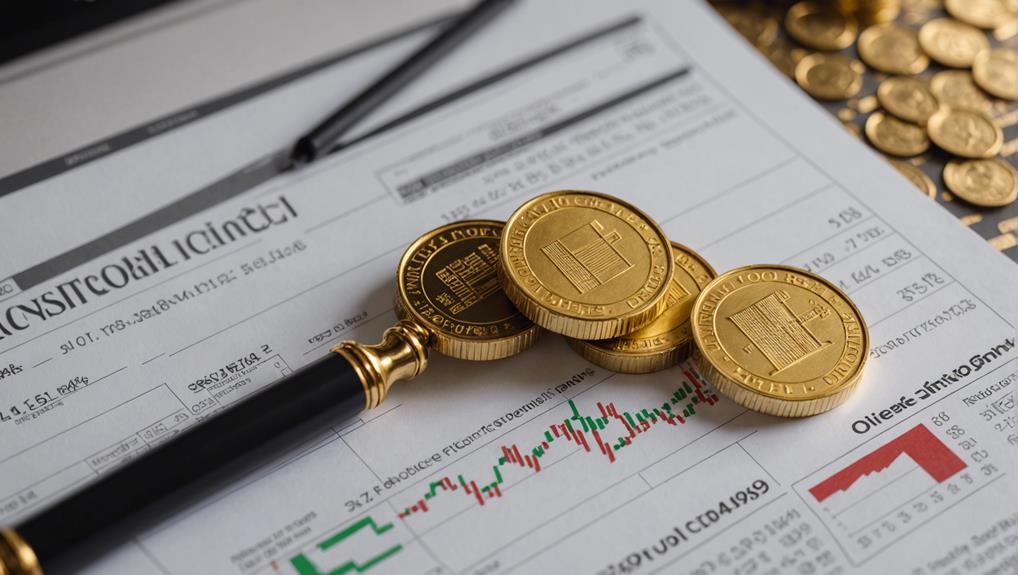Choosing the best gold mutual funds for your investment strategy requires careful consideration of several factors, including expense ratios, historical performance, and the expertise of the fund manager.
Focus on funds with competitive costs and a solid track record. Additionally, understanding the nuances, such as tax implications, can significantly impact your returns.
Considering a diversified approach can enhance your portfolio's stability. By examining these elements, you can make informed investment decisions.
My Quick Highlights
- Evaluate expense ratios to ensure cost-efficient management and higher potential returns over time.
- Assess historical performance and risk-adjusted returns to gauge consistency and reliability.
- Verify fund manager expertise and track record in gold investments for informed decision-making.
- Analyze asset allocation strategies among mining stocks, physical gold, and gold-related securities.
- Consider tax implications and utilize tax-advantaged accounts like IRAs for optimal tax benefits.
Advantages of Gold Mutual Funds

Gold mutual funds provide a convenient way for investors to gain exposure to the gold market without purchasing physical gold. These funds diversify by including a variety of gold-related assets, which helps spread risk. They can improve portfolio allocation strategies by balancing investments against other assets.
Acting as an effective hedge against inflation, gold mutual funds protect purchasing power during economic uncertainties. Generally, they've lower expense ratios compared to actively managed funds, making them cost-effective. Trading these funds on stock exchanges is straightforward, ensuring liquidity and flexibility.
Investing in gold mutual funds can be a strategic move, combining potential capital appreciation with added financial security.
Categories of Gold Mutual Funds
When evaluating gold mutual funds, you'll encounter two main categories:
Gold Equity Funds invest in companies involved in gold mining and production, offering a way to benefit from the performance of these businesses.
Gold ETF Funds track the price of gold itself, providing a direct exposure to the metal's market value.
Gold Equity Funds
Investing in gold equity funds offers a unique opportunity to explore companies involved in gold mining, exploration, and processing. These funds primarily invest in gold mining stocks, providing an indirect way to benefit from rising gold prices.
Unlike gold commodity funds that focus on physical gold, gold equity funds capitalize on the performance of gold-related stocks in the market.
The performance of gold mutual funds in this category is closely linked to gold prices and the profitability of mining companies. By diversifying your portfolio with gold equity funds, you can achieve potential capital appreciation.
Select from a variety of funds based on your investment objectives and risk tolerance, ensuring alignment with your financial goals.
Gold ETF Funds
Investing in Gold ETF funds allows you to gain exposure to gold prices without owning physical gold. These exchange-traded funds (ETFs) provide a cost-effective way to diversify your portfolio with gold-related assets. Typically, they've expense ratios of less than 0.5%.
You can trade gold ETFs on stock exchanges like regular stocks, making buying and selling straightforward. They're also commonly included in gold-based IRAs, appealing to a wide range of investors. Gold-backed mutual funds through ETFs offer liquidity and potential tax advantages.
Key Criteria for Selection

Selecting the appropriate gold mutual funds requires examining several key criteria to ensure alignment with your investment strategy. Focus on expense ratios, which range from 0.88% to 2.32%. Lower expense ratios help maximize returns.
Performance evaluation is also vital; examine 1-year returns, which can range from 0.05% to 0.17%. Assess the fund's total assets, ranging from $42.04 million to $834.11 million, as larger funds often offer more stability.
Prioritize long-term growth objectives, particularly for capital appreciation and inflation protection through investments in precious metals. Ensuring these criteria align with your goals will help you make an informed decision.
Analyzing Investment Approach
When analyzing the investment approach of gold mutual funds, focus on how they allocate assets among mining stocks, physical gold, and gold-related securities. Typically, these funds invest in a mix of these assets to balance risk and return.
Monitor gold price trends, as they significantly impact fund performance. Gold market volatility is another crucial factor; funds that manage this volatility effectively can offer more stable returns.
Understanding the fund's investment strategy helps gauge its potential performance during economic uncertainties and inflation. By examining these aspects, you can make a more informed decision on which gold mutual funds align with your investment strategy.
Evaluating Fund Manager Expertise

Evaluating fund managers' expertise is crucial for predicting the success of your gold mutual fund investment. Focus on their track record and their ability to navigate the precious metals market.
Follow these four steps to assess their expertise:
- Review the Manager's Track Record: Examine their history with gold mutual funds and their performance over time.
- Experience with Gold Production and Supply: Verify their understanding of the complexities of gold production and global supply and demand dynamics.
- Performance Against Benchmarks: Determine if they've consistently outperformed industry benchmarks and their peers.
- Knowledge of Gold Reserves in India: Evaluate their awareness of significant gold reserves in India, as this can impact global prices.
These steps will help you make a well-informed decision.
Comparing Costs and Expenses
Understanding the costs and expenses of gold mutual funds is crucial for making informed investment decisions. Expense ratios, which include management costs and trading expenses, typically range from 0.70% to 1.49%. Lower expense ratios can significantly enhance your returns over time. Comparing these ratios across different gold mutual funds helps you identify the most cost-efficient options. The following table provides a comparison:
| Fund Name | Expense Ratio | Management Costs |
|---|---|---|
| Gold Fund A | 0.70% | Low |
| Gold Fund B | 1.10% | Medium |
| Gold Fund C | 1.49% | High |
| Gold Fund D | 0.85% | Low-Medium |
| Gold Fund E | 1.30% | Medium-High |
Evaluating these costs will guide you in choosing the best gold mutual funds, ensuring maximum returns and efficient management of your investments.
Reviewing Past Performance

Reviewing Past Performance
After comparing costs, the next step is to review the past performance of gold mutual funds to gauge their historical returns and consistency. By examining these funds over different time periods, you can understand their resilience and potential for growth.
Key areas to focus on include:
- Historical Returns: Analyze returns over 1, 3, 5, and 10-year periods to identify trends.
- Benchmarks: Compare the fund's performance against relevant benchmarks to measure its relative success.
- Risk-Adjusted Returns: Assess returns considering the volatility and risk taken by the fund.
- Consistency: Determine if the fund consistently meets or exceeds expectations under various market conditions.
Reviewing these aspects will help you make an informed decision about your investment strategy.
Tax Considerations
When investing in gold mutual funds, you need to consider the tax implications of capital gains, which are the profits from selling your fund shares.
Holding these funds in tax-advantaged accounts like IRAs can help defer or eliminate taxes on your gains.
Additionally, the tax rates differ based on how long you hold the funds, with short-term gains taxed at higher rates than long-term gains.
Capital Gains Taxation
Capital gains tax directly impacts the profitability of your gold mutual funds, so strategizing your investments is crucial. Understanding tax implications is essential for maximizing returns.
Consider these important points:
- Short-term capital gains: Gains from gold mutual funds held for a year or less are taxed at your regular income tax rate, which can be quite high.
- Long-term capital gains: Holding investments for over a year can lower your tax rate, typically ranging from 0% to 20%.
- Tax implications: Factor in these considerations when deciding to sell your gold mutual funds.
- Consult a tax advisor: They can offer tailored advice based on your specific situation.
Tax-Advantaged Accounts
Maximizing the benefits of gold mutual fund investments often involves leveraging tax-advantaged accounts like IRAs and 401(k)s. These accounts offer tax-deferred growth, meaning your investments can grow without immediate tax liabilities.
Traditional IRAs allow for tax-deductible contributions, which can reduce your taxable income now. Roth IRAs provide tax-free withdrawals in retirement, making them ideal for long-term gold mutual fund investments.
Gains within these tax-advantaged accounts aren't subject to capital gains taxes until you make withdrawals, allowing your investments to compound more efficiently.
Utilizing tax-advantaged accounts helps maximize the growth potential of your gold mutual fund investments while minimizing your tax liabilities.
International Tax Implications
Understanding the international tax implications of gold mutual funds is crucial for optimizing your investment returns. Different countries have varying tax rules that can significantly affect your investments. Here are some key points to consider:
- Withholding Taxes: Many countries impose withholding taxes on dividends and capital gains from international gold mutual funds. These taxes can reduce your overall returns if not properly managed.
- Tax Treaties: Tax treaties between countries can lower or eliminate withholding taxes, offering potential benefits to your investment returns. It's important to understand the specific treaties applicable to your investments.
- Country-Specific Rules: Each country has unique tax regulations that impact how gold mutual funds are treated. Being aware of these rules is essential for compliance and optimizing tax efficiency.
- Professional Advice: Consulting a tax advisor who's knowledgeable about international tax laws can help you navigate these complexities and make informed investment decisions.
Integrating Into Diversified Plan

Incorporating gold mutual funds into your diversified investment plan helps reduce risks and provides valuable exposure to the precious metals sector. By including gold mutual funds, you diversify beyond traditional equity and fixed-income investments. This addition can mitigate risks associated with market volatility and geopolitical uncertainties.
Gold mutual funds also offer a hedge against inflation, preserving your portfolio's value during economic downturns. Investing in these funds allows you to tap into the long-term growth and capital appreciation potential of precious metals. This strategic move strengthens your diversified investment plan and enhances your ability to weather various market conditions.
Integrating gold mutual funds creates a more resilient and balanced portfolio.
Conclusion
Choosing the best gold mutual funds involves evaluating expense ratios, historical performance, fund manager expertise, and tax implications. Focus on funds with competitive costs, strong growth potential, and diversified gold investments.
Assess fund managers’ track records and experience in the gold market. Consider tax strategies to optimize returns and minimize liabilities. By carefully examining these factors, you can make informed decisions that align with your investment goals and risk tolerance, ensuring a balanced and effective gold mutual funds investment.
The Gold Information Network
11900 Biscayne Blvd, Ste 127B, Miami, FL 33181
(305) 449-9094
https://goldinfo.net







